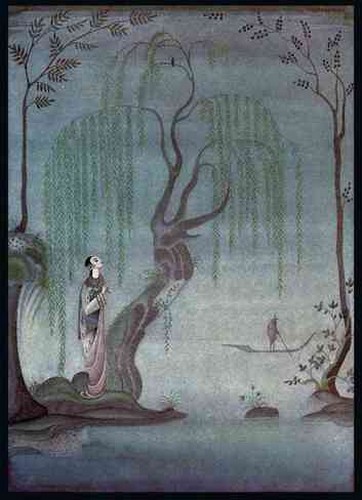
Today, I'm talking about the first recital, the SV16 opening concert, that will take place on August 18, within eight days. We'll listen to two regular artists at the festival, mezzo-soprano Juliane Banse and pianist Wolfram Rieger, who will perform songs by Brahms, Schubert and Duparc. When reviewing the programme, which is really beautiful, I found five songs we’ve heard so far: two of Brahms, two of Duparc and one of Schubert. And I really chose wonderful versions!
- Die Mainacht is one of my favorite Lieder by Brahms; as I said when I introduced it, we find a poem full of Romanticism (night, nature and solitude gathered together) that the composer takes up to turn into a touching song. Our performers were Hermann Prey and Gunther Weißerborn.
- Feldeinsamkeit is another great song by Brahms, a moment of peace in perfect communion with nature. We listened to it with Christa Ludwig and Geoffrey Parsons.
- The two pieces of Duparc also are essential in repertoire. The first one is Chanson triste, an early work that the composer dedicated to Ellie Mac Swiney, who, eventually, became his wife. Our version was that of Jonas Kaufmann and Helmut Deutsch.
- The second mélodie by Duparc is L'invitation au voyage, a song that, as I told you long ago, contains one of my favorite verses: Là, tout n'est qu'ordre et beauté. Jose van Dam and Maciej Pikulski were our performers.
- Finally, Abendstern is one of the many lieder by Schubert taking about stars. A sad love song that we heard in the voice of Anthony Rolfe-Johnson accompanied by Graham Johnson.
We'll listen to An die Nachtigall, as in Vilabertran, sung by Juliane Banse; her accompanist won't be, in this case, Wolfram Rieger but Aleksandar Madžar.
Geuß nicht so laut der liebentflammten Lieder
Tonreichen Schall
Vom Blütenast des Apfelbaums hernieder,
O Nachtigall!
Du tönest mir mit deiner süßen Kehle
Die Liebe wach;
Denn schon durchbebt die Tiefen meiner Seele
Dein schmelzend Ach.
Dann flieht der Schlaf von neuem dieses Lager,
Ich starre dann.
Mit nassem Blick, und todtenbleich und hager,
Den Himmel an.
Fleuch, Nachtigall, in grüne Finsternisse,
Ins Haingesträuch,
Und spend’ im Nest der treuen Gattin Küsse;
Entfleuch, entfleuch!
Do not pour forth your love-enflamed songs'
Tuneful sounds so loudly,
Down from the blossoming branch of the apple tree,
O Nightingale!
With your sweet throat, you call me and
Awaken Love within me;
For already the depths of my soul are stirred
By your melting cry.
Sleep flees once more from this place,
I stare then
With a tearful gaze, deathly pale and haggard,
At the sky.
Fly, nightingale, off into the green darkness,
Into the bushy grove.
And shower kisses on your faithful mate in your nest,
Fly off, fly off!














Comments powered by CComment